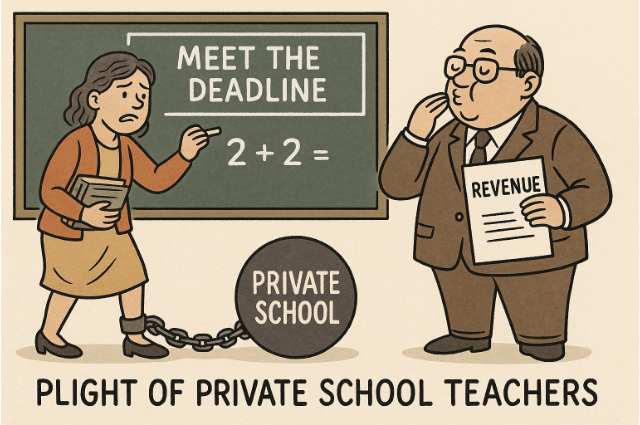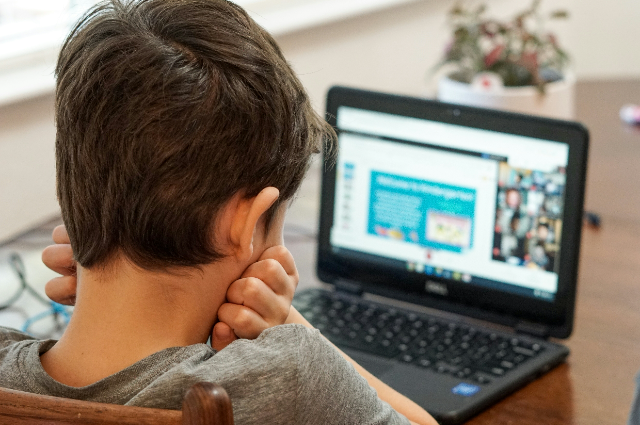
Picture by DALL.E 3
Business of Education: The Private School Teacher’s Chronicles
Once upon a result day (that fateful annual festival for schools), four students from a private school scored 99 out of 100 in English. The school's Instagram handle burst into celebration — “Hard work pays off!”, “Kudos to our team!”, “Proud moment for XYZ International Convent Academy for Genius Scholars (TM)”. Meanwhile, in a quieter corner of the staffroom, the very teacher who taught those students was told she had “not given her best this year” and would be let go.
Yes, she got fired.
Let that sink in. A teacher with actual skills, empathy, and love for language — someone I personally learned a lot from — was expelled from the system for underperforming, in a year when her students outperformed. The irony was not just lost — it was dismissed. This isn’t just a one-off case; it’s a pattern. And it’s high time we talk about the plight of private school teachers and the corporatization of education.
Private Schools or Corporate Empires?
There was a time when private schools offered an alternative to rigid government systems — more flexibility, more innovation, better exposure. But that was then. Today, many private schools have evolved (or devolved?) into full-blown business hubs. They sell dreams of “international-level education” with robotic precision and billboard aesthetics, often forgetting that schools are meant to educate, not advertise.
Smart boards are installed. Fancy apps are launched. Uniforms are updated bi-annually. And all this comes at a cost — mostly borne by underpaid teachers and overburdened students. Amidst this, the private school teacher is made to juggle more roles than a Bollywood character — mentor, clerk, decorator, event manager, therapist, social media handler, and sometimes, a scapegoat.
The Pay-Pressure Paradox
Private school teachers are, quite literally, doing more for less.
While government school teachers enjoy pay scales, regular increments, pension benefits, and most importantly, job security, their private school counterparts often earn peanuts. In some schools, newly hired teachers are paid less than the school fees of a single student. And no, I am not exaggerating.
Despite this, private school teachers are expected to meet impossible deadlines, generate creative worksheets every week, track individual performance graphs for each child, coordinate annual day rehearsals, and oh yes — stay back after school hours “voluntarily” for extra classes or meetings that could’ve been emails. Its productivity culture at its worst, camouflaged as “passion for teaching.”
Bootlicking: The Unofficial Skillset
Merit, skill, and dedication should define a teacher’s career. But in many private schools, a different rulebook applies — one that includes smiling at every admin decision, volunteering for every weekend event, and being visible enough in all the right WhatsApp groups.
Let’s not mince words — bootlicking is a survival skill here. I’ve seen exceptional teachers — the quiet, thinking ones who actually care about the student’s learning journey — being sidelined. Meanwhile, those who master the art of excessive flattery and visible obedience rocket up the promotional ladder.
My English teacher, the one I mentioned earlier, had every quality a school could ask for. She didn’t shout. She wasn't ashamed. She didn’t recite Wikipedia. She made grammar fun. She helped students think. But unfortunately, she didn’t master the one skill her peers seemed to have — constant performative loyalty to the administration. So, she had to go.
“Didn’t give her best” — that was the excuse. LMAO, if I may.
Teaching ≠ Knowing
Let’s address another elephant in the staffroom. Many schools hire teachers based on qualifications, which is fine, but qualifications alone do not make a good teacher.
A person might have a PhD in Physics but zero classroom empathy. Another might be an excellent listener and communicator but gets overlooked because their CV lacks academic fireworks. Schools forget: teaching is not about what you know — it’s about how you share it.
It's about pacing, understanding varied learning styles, building trust, and making students feel safe enough to ask “stupid” questions. It’s about being human, not robotic. But when teachers are expected to finish three chapters a week, prepare test papers every other day, and fill in progress reports with 14 parameters — where’s the room left for reflection, discussion, or actual teaching?
Students as Assembly-Line Products
This profit-first mindset isn’t just damaging for teachers. It’s wreaking havoc on students too.
Many private schools today run like assembly lines. The goal? Produce rank-holding, English-speaking, Olympiad-winning students who can be paraded on every advertisement. The side effect? Mechanised children who may ace exams but struggle with communication, empathy, creativity, or even mental health.
Co-curricular activities — once the joy of school life — have now become occasional indulgences, usually limited to one “Annual Function” every year, where 30 students perform and 1000 others clap. Sports? Downgraded. Theatre? Too risky. Debate? Too time-consuming. Who has the time to develop the whole child when the CBSE board exams are looming like a tsunami?
Personalised Learning: Boon or Bubble?
Enter personalised learning. The shiny new term in the education industry. AI-powered modules, learning profiles, adaptive quizzes — all promising to address each child’s unique needs.
And yes, it’s wonderful in many ways. Students who struggle in a classroom of 40 finally get some attention. Learning can happen at one’s own pace. But here’s the thing — too much individuation leads to isolation.
Learning, historically and neurologically, is a social activity. We learn best when we argue, laugh, mimic, challenge, and explain things to one another. But now, more students are glued to screens, with headphones on, studying alone. They may learn content — but they’re losing out on shared learning, peer bonding, and collective memory.
This reminds me of that beautifully haunting short story we read in school — The Fun They Had. Set in the future, it talks about a girl who studies from a screen alone, missing the old days when kids went to school together. It seemed like science fiction then. But today? We’re dangerously close to that reality.

Photo by Thomas Park on Unsplash
Mental Health: The Unspoken Crisis
Teachers are stressed. Students are anxious. Parents are worried. But we’re all pretending that the Excel sheets look good, so everything must be fine.
The truth? Many private school teachers suffer from burnout, chronic stress, and sometimes depression — all while pretending to be cheerful facilitators of “learning joy.” They are held accountable for every low score, every parental complaint, every missing signature — while given very little emotional support or institutional backing.
It’s a thankless job. And yet, they show up.
Because they care.
So…What Now?
The private school system needs serious introspection. If we continue treating teachers as overworked, underpaid customer service agents, we’ll drive out the very people who keep education alive. The same applies to students — if we don’t allow them space to breathe, explore, fail, and express, we’ll be left with hollow achievers instead of well-rounded human beings.
Some thoughts moving forward:
- Pay teachers fairly. If you can afford marble floors and LED name plates, you can afford dignified salaries.
- Respect time. Teachers aren’t machines. Let them rest. Let them read. Let them evolve.
- Prioritise holistic development. Not everything is about marks. Allow co-curriculars to thrive.
- Stop the performative culture. Promotions should come from merit, not proximity to power.
- Rethink personalisation. Let it support, not replace, collective classroom experiences.
- Create safe environments for students and teachers.
In Conclusion: A Love Letter, Sort Of
This article may sound like a rant, but it’s actually a love letter to every private school teacher who stayed late, answered that 9 p.m. parent query, photocopied worksheets during lunch, handled hormonal teenagers with grace, and still found time to smile at a struggling student.
You are not forgotten. You deserve better. And one day, hopefully, the system will catch up to what you already know:
That education is not a transaction.
It’s a relationship.
And good teachers are its backbone, not its marketing team.
